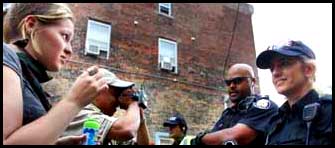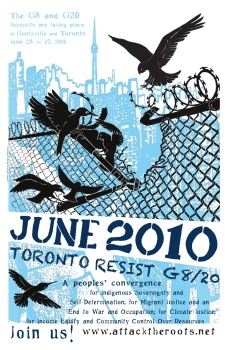
[This is an expanded version of the comment I posted to the CBC’s online article Toronto’s ‘Officer Bubbles’ sues YouTube. Of course, it’s subject to moderation and I have had many comments well within stated CBC guidelines declined. So I decided to post this here as it’s too important an issue to let slip through the cracks.]
The calls for an Inquiry into the G8/G20 debacle aren’t going away, they are getting louder.
What level of ridicule is reasonable?
A great many Canadian citizens (not to mention a great many international Internet users) witnessed Officer Bubbles attempting to intimidate a protester. And although the protester complied— she put down her dangerous bottle of soap bubbles— within moments she was arrested anyway.
[View this video in OGG format: http://russwurm.org/hostess/frombubblestobookings.ogv]

There were cameras everywhere.
Officer Bubbles certainly knew he was being recorded when he took his stand. The protester
with a camera stood directly in front of him—
close enough to reach out and touch.
And Officer Bubbles had his 15 minutes of fame.
But now Officer Bubbles wants to protect himself from harassment?
p2pnet reports: ‘Pay me $1.2M’ Officer Bubbles tells YouTube
A National Post article lauds this lawsuit, believing Officer Bubbles’ attempt to intimidate by lawsuits is a blow for… accountability?
Will the courts allow citizens to be stripped of the right to comment anonymously? If you make an anonymous comment expressing your disagreement with a situation like this, can you be sued? Is an opinion slander? Or since it’s published online libel?
Anonymity can be a powerful tool for good. Whistleblowers can leak information that their consciences dictate ought to be public which often serves the public good.
Must we guard our opinions, and take care not to voice them for fear of litigation?
Using lawsuits to squash the cartoons that ensued is a terrible precedent for the future of free speech and free expression in Canada. It’s interesting to note that Officer Bubbles is not attempting to take down the video. After all, it really happened.
The fact is he spoke and acted, knowing he was being filmed. Performing his professional duties as an officer of the law, on a public street, as a matter of public record. Officer Bubbles is a public servant interacting with a member of the public. In this context, Officer Bubbles should be no more immune from depiction in political cartoons than the Mayor or the Prime Minister?

I must have dozed off at the part where they made political cartoons illegal in Canada. Is that in Bill C-32?
silencing dissent before it happens
Meanwhile, there is another protester that there is no video for.
This protester was arrested before he even had a chance to protest the G8/G20 — before it even began — apparently on the basis of Twitter remarks which led to a search warrant. The result is that Byron Sonne was arrested, and languishes in jail some four months later, denied bail by a Justice of the Peace.
Malcolm Gladwell may not believe in online activism, but Canadian police services take it seriously.
A Justice of the Peace isn’t a lawyer, or a judge. This is a political appointment. I have to wonder if a Justice of the Peace, an appointed position not requiring formal legal education, is the right person to be making decisions about who is or is not entitled to bail? It’s bad enough that in criminal offenses, the decision as to whether a defendant can walk free between accusation and trial may fall victim to a JP’s personal bias.
But to have political appointees ruling on the liberty of those accused of political offenses during peaceful protests is simply ludicrous. A Justice of the Peace appointed by the government of the day can hardly be expected to be impartial, especially in cases of political dissent.
Many laws have built in latitude enabling them to cover a range of infractions. There is certainly latitude in every one of the charges brought against Byron Sonne, allowing the exercise of a great deal of discretion.
This certainly becomes an issue in a world where a soap bubble is adjudged a weapon by the forces of Canadian law enforcement.


